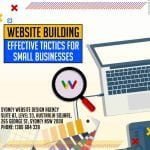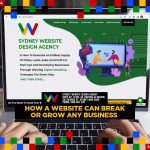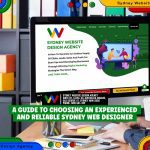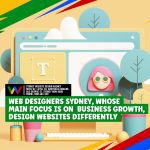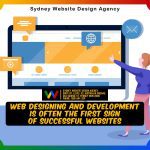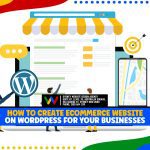Boost Your Business Growth with the Help of a Web Designer
In this digital age, having an online presence is essential for any business to grow and reach its full potential. A Sydney-based web design provider can help your business leverage the power of the internet by creating a website that will attract customers and showcase your products or services. With their expertise in design, content management systems, and development, they can craft an engaging website that will make it easier for you to reach out to more customers and ultimately increase sales.
Furthermore, a good web development process will be able to provide ongoing support, so your website remains up-to-date with current trends, technologies, and strategies for building custom websites that are necessary for success. In short, hiring a web design team or professional service is one of the best investments you can make if you want your business to succeed in today’s competitive market.
Introduction
A web designer can have a significant impact and boost your business growth? If you’re like most business owners, you’re probably doing many things yourself. You may be handling the bookkeeping, the marketing, and even the day-to-day operations. But when it comes time to create a new website, many business owners hire a web designer or website design agency instead of trying to take on the project themselves. After all, it can’t be that hard to create a website that impacts business growth, can it?
Well, actually, it can be pretty difficult. And if you’re not experienced in web design or development over a decade before, there are plenty of potential pitfalls that you could fall into. In this article, we’ll look at some consequences of not having a web designer create your website.
Table of Contents
‘
Why is Having a Great Website Design Important
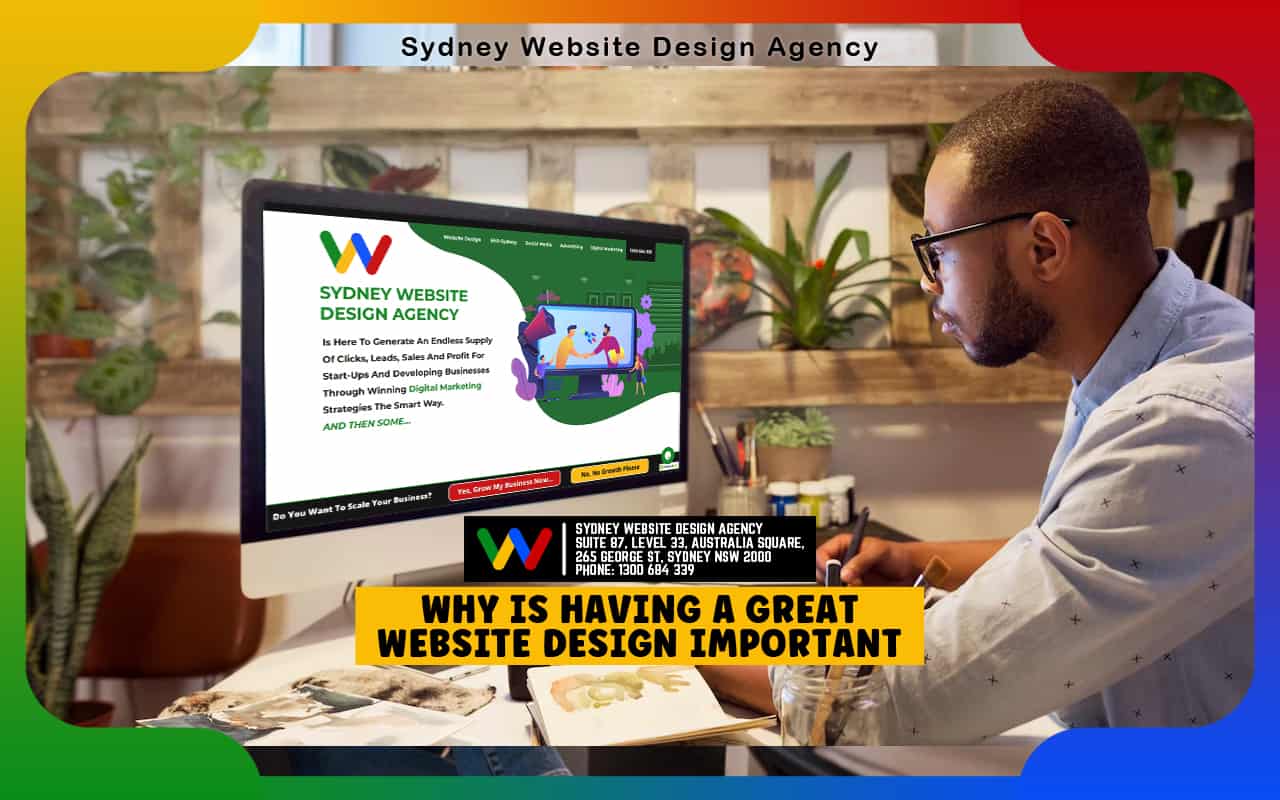
Having an outstanding responsive web design process in place is a vital aspect of any business’s online presence in today’s digital age. A great website design can help you stand out from the competition, attract and retain customers, and ultimately drive business growth. From the first impression it makes on visitors to its overall usability, a well-designed website can impact every aspect of your online presence, whether on a computer desktop or even in mobile devices.
We will delve into the key reasons why having a great website design is so important and how it can help you achieve your business goals. From enhancing your brand image content marketing, building your online stores to improving search engine optimisation and user experience, the benefits of a great website design are numerous and should not be underestimated.
Having a great website design is important for several reasons:
First impressions matter
Your website is often the first point of contact between your business’ marketing team and potential customers, and a great design can make a positive first impression. A well-designed custom website can create a professional image and help establish credibility with customers.
User experience
Great web development services should be user-friendly, easy to navigate, and provide a positive experience for visitors. A good user experience can lead to higher engagement, increased conversion rates, better digital presence, and improved customer satisfaction.
Brand identity
A great website design can help reinforce your brand identity and differentiate your business from your competitors. A well-designed website can showcase your brand’s personality, values, vision, and can transform into a digital marketing machine.
Search engine optimisation (SEO)
A great website design can also help with search engine optimisation (SEO) by making it easier for search engines to crawl and index your website, which can help improve your search rankings.
Mobile responsiveness
With the growing use of mobile apps and devices to access the internet, it is essential to have a website that is optimised for mobile devices. A great website design should be responsive and adjust to different screen sizes and devices.
Characteristics of a Poorly Designed Website
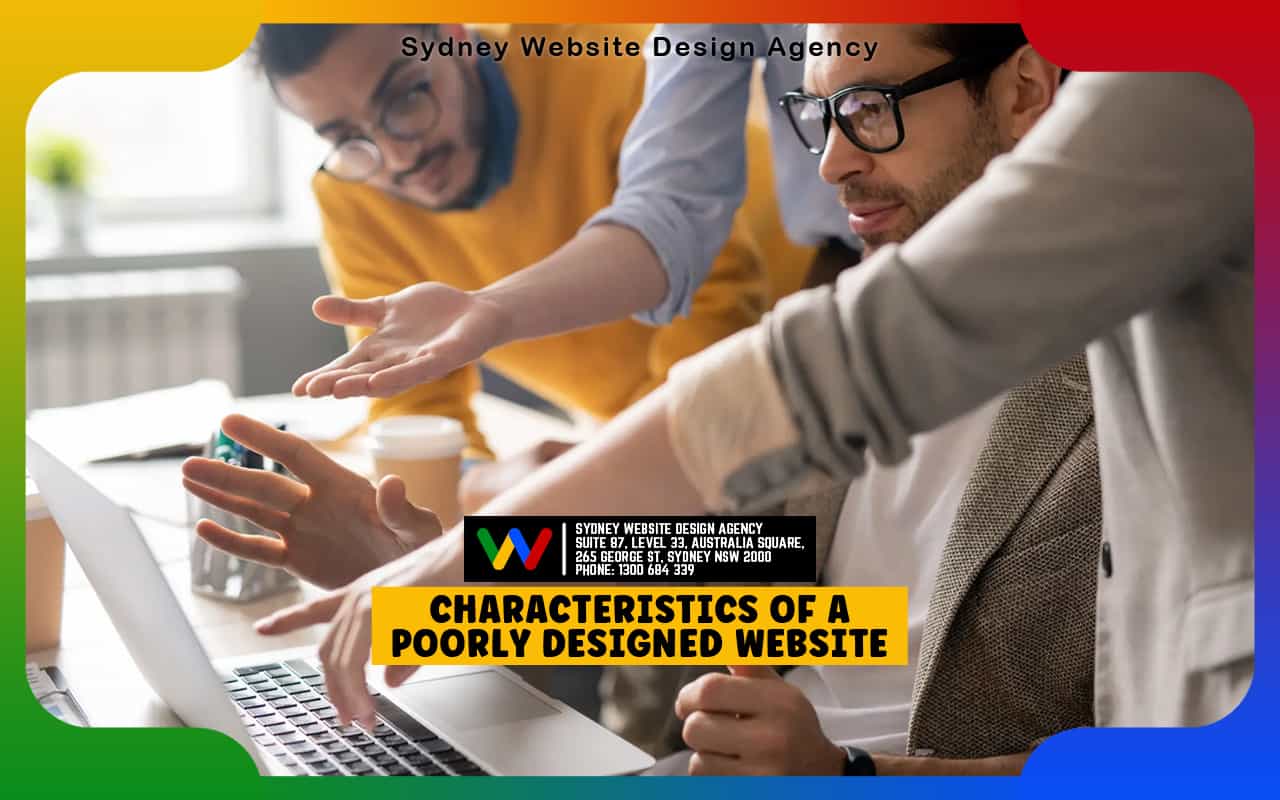
There are some key characteristics of a poorly designed website that can cause it to fail in delivering its intended purpose.
Poor Navigation
A site with poor navigation will be difficult for users to navigate, causing them to become frustrated and eventually leave the site. Poor navigation can also prevent search engines from indexing the website correctly.
Outdated Design
Websites with outdated design elements such as old HTML code or non-optimised images can make it difficult for visitors to interact with your site and make it look unprofessional.
Slow Loading Times
If a website takes too long to load, visitors may click away before they have even seen the content. This is because people typically expect websites to load quickly.
Lack of Mobile Optimisation
Nowadays, people access websites on their mobile devices more than ever before. If a website is not optimised for mobile devices, users may struggle to view content and navigate the site.
Too Many Promotions
Promoting your services can be a good way to generate leads from your website, but displaying too many promotions will make it difficult for visitors to find what they are looking for and detract from the overall user experience.
Poor Quality Content
Low-quality content that has spelling errors or doesn’t provide any real value can deter visitors and cause them to leave your site quickly. Poorly written copy also makes it difficult for search engines to crawl the website correctly.
No Contact Information
Not providing contact information or a way for visitors to reach out with questions can make them feel like they are not valued and that there is no one available to help.
Unclear Call-to-Action
A website should always have a clear call-to-action, such as encouraging users to sign up for an email list or buy a product. Without this, visitors may not know what the next step is and leave the site without taking any action.
By understanding the characteristics of a poorly designed website, you can avoid making these mistakes and create an efficient website that meets all of your goals. Additionally, it’s important to periodically review and update your website design to keep up with the latest trends and ensure your website is providing a great user experience.
The Basics of Every Website Design

Every website design should have the following basic elements to ensure it is effective and user-friendly:
Navigation
A clear and intuitive navigation menu is essential for helping visitors find what they are looking for and explore your website.
Visuals
A well-designed website should also have eye-catching visuals, including images, graphics, and videos, to enhance the user experience and break up large blocks of text.
Branding
Your website should include your brand’s logo, colour palette, and typography to reinforce your brand identity and create a consistent experience across your online store and all platforms.
Calls to action (CTAs)
Your website should include clear calls to action (CTAs) that encourage visitors to take a specific action, such as making a purchase or signing up for your newsletter.
Responsiveness
A great website design should be responsive and adjust to different screen sizes and devices to ensure an optimal user experience for all visitors.
Loading speed
A fast-loading website is crucial for improving user experience and maintaining visitor engagement.
How to Find a Reliable Web Designer
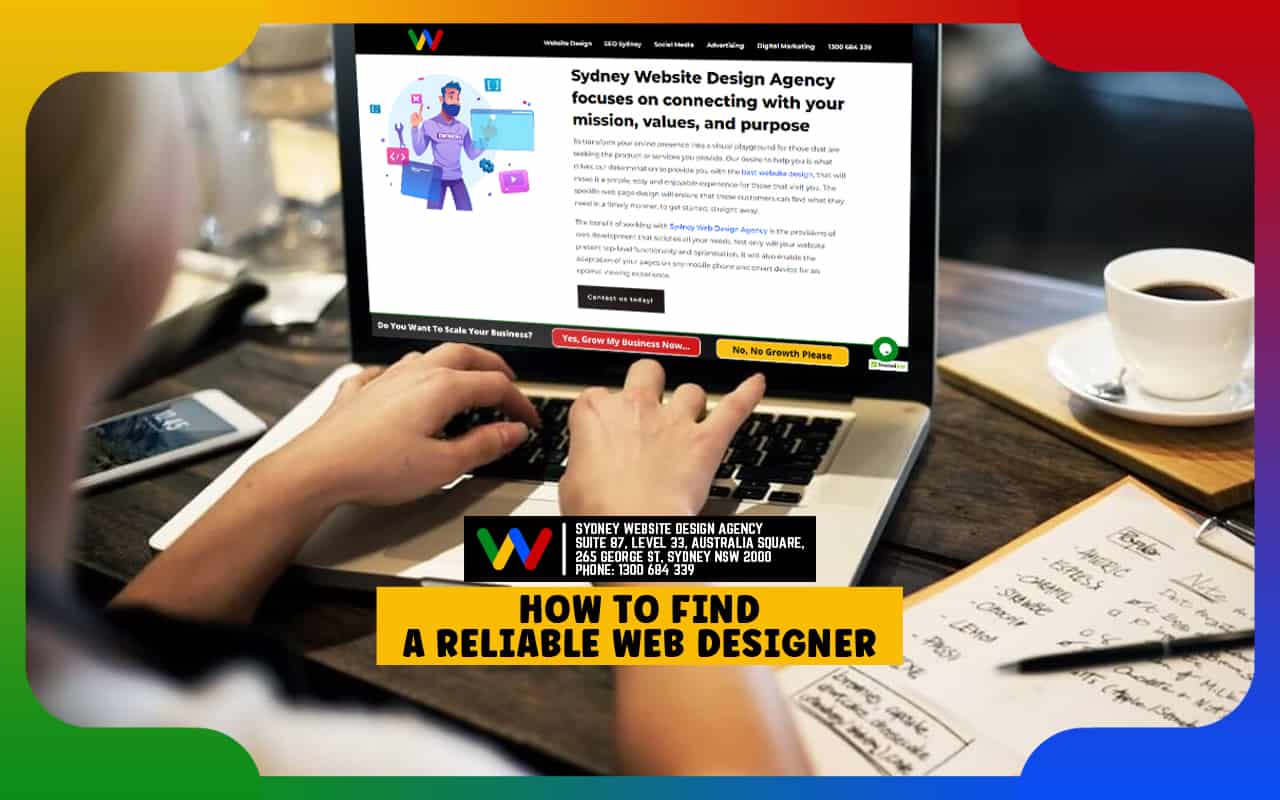
Finding a reliable web designer can be difficult. You want to make sure that you hire someone who will produce quality work in a timely manner and within your budget. Here are some tips for finding the right web designer for you:
Ask for referrals from people you trust.
Word of mouth is one of the best ways to find a reliable web designer, since it gives you firsthand evidence of their past work. Ask friends, family, colleagues, or even local businesses if they have any recommendations for experienced web designers that they’ve used in the past and were pleased with the results.
Research potential candidates online
Spend some time researching each potential candidate on design portfolio sites such as Dribbble, or Behance. Browse through the designer’s portfolio to get a feel for their style and to make sure it fits your own preferences.
Read customer reviews
Before deciding, read online reviews from past customers of the digital marketing agency or web designer you are considering hiring. Take any negative reviews with a grain of salt, but pay attention to common themes that might reveal potential red flags.
Have an initial conversation
Once you have narrowed down your list of potential candidates, reach out to each one via email or phone and explain what type of project you need help with. During this initial conversation, ask questions about the designer’s process and timeline, so you can determine if they will be able to meet your requirements.
Review their contract and terms of service
Before you decide to hire a web designer, make sure to review their contract and terms of service to ensure that all the details are clear and agreeable. Also take note of any payment schedules or cancellation policies, so you know what to expect if something goes wrong during the project.
By following these tips, you will be able to find a reliable web designer who can help you create an attractive website that meets your needs.
How Much Do You Need to Invest?
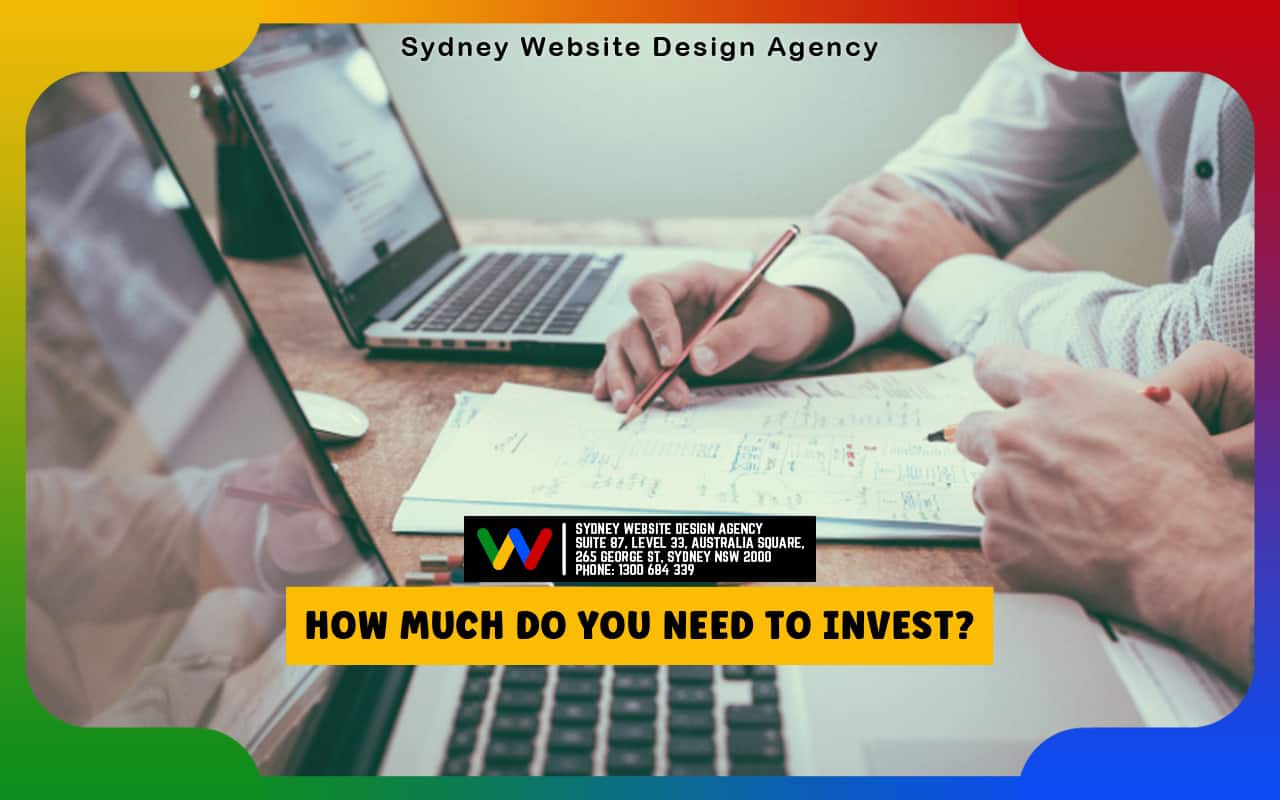
The cost of web design services can vary widely, depending on the scope of the project and the level of expertise required. Some factors that can influence the cost of web design services include:
Complexity of the design
The more complex the design, the more time and effort it will take to complete, which can result in a higher cost.
Customisation
Customised designs will typically cost more than pre-made templates or generic designs.
Level of expertise
Working with a highly experienced web designer will generally be pricier than working with a less experienced designer.
Location
The cost of web and graphic design services can also vary based on location. Designers in larger cities or metropolitan areas may charge more than designers in smaller cities or rural areas.
Type of website
The cost of designing a simple brochure-style website will be less expensive than designing a complex e-commerce website with multiple product categories and payment options.
On average, the cost of web design services can range from a few hundred dollars for a simple brochure-style website to several thousand dollars for a complex e-commerce website. It is important to clearly understand your budget and the level of expertise you require before starting a web design project to ensure that you receive the best value for your investment.
Web Designer Frequently Asked Questions

What is responsive web design, and why is it important for my website?
It employs flexible grids, images, and CSS media queries to automatically adjust the layout and content based on the device used to access the site.
Responsive design is essential because it improves usability by eliminating the need for horizontal scrolling or zooming in on mobile devices. Additionally, it boosts SEO rankings as search engines prioritise mobile-friendly websites in their algorithms.
Moreover, responsive design increases mobile traffic and engagement, as users are more likely to stay on a site that offers a smooth and intuitive browsing experience across all devices.
How can I find the best web designers for my project in Sydney, Australia?
Review portfolios and case studies to assess the quality and diversity of their previous work. Look for web designers with extensive experience in custom web development and responsive design, as these skills are crucial for creating high-quality websites tailored to your specific needs.
Furthermore, prioritise designers who demonstrate excellent communication skills, professionalism, and a commitment to delivering exceptional customer service. By considering these factors, you can identify talented web designers who are capable of bringing your vision to life and exceeding your expectations.
What are the benefits of ongoing website maintenance for my online store?
By investing in ongoing maintenance, you can prevent downtime, security breaches, and loss of revenue due to website errors or malfunctions.
Additionally, website maintenance allows you to stay current with the latest technology trends and industry standards, ensuring that your site remains competitive in the ever-evolving digital landscape.
Consistent updates and improvements enhance user experience, leading to higher customer satisfaction and retention rates. Ultimately, ongoing website maintenance is essential for safeguarding your brand reputation, driving conversions, and maximising the return on investment (ROI) of your online store.
What role does content management system (CMS) play in website development?
CMS platforms offer user-friendly interfaces and intuitive tools for organising and publishing content, making it easier to maintain a dynamic and engaging website. With a CMS, you can easily add new pages, upload images, update product listings, and optimise content for search engines.
CMS platforms provide robust features for user authentication, permissions management, and version control, allowing multiple users to collaborate on content creation and management tasks.
Whether you’re running a blog, an e-commerce site, or a corporate website, a CMS streamlines the content management process, saving time and resources while empowering you to maintain a professional and up-to-date online presence.
How can search engine optimisation (SEO) enhance the performance of my website?
SEO encompasses various tactics, including keyword research, on-page optimization, link building, and technical optimization, all of which work together to improve your site’s relevance and authority in the eyes of search engines.
SEO helps you better understand your target audience’s search intent and behavior, allowing you to tailor your content and messaging to meet their needs effectively.
Ultimately, by investing in SEO, you can establish a strong digital presence, outperform competitors, and achieve sustainable growth for your website and business.
What are the key components of user interface (UI) design for modern websites?
Key components of UI design for modern websites include intuitive navigation menus that guide users seamlessly through the site, clear calls-to-action (CTAs) that prompt desired user interactions, consistent branding elements that reinforce brand identity, and responsive layouts that adapt to different screen sizes and devices.
UI designers prioritise accessibility and usability, ensuring that all users, regardless of their abilities or devices, can interact with the website effectively and enjoy a positive user experience. By incorporating these components into the design process, UI designers create engaging and intuitive interfaces that captivate audiences and drive conversions.
How do website builders differ from custom web development services?
While website builders are user-friendly and cost-effective, they offer limited customization options and may lack advanced features or scalability for complex projects. In contrast, custom web development involves creating bespoke websites tailored to specific requirements and objectives.
Custom development offers greater flexibility, control, and scalability, allowing businesses to create unique and innovative solutions that align with their brand identity and strategic goals.
While custom web development typically requires more time and resources than using a website builder, it offers greater potential for long-term success and differentiation in the competitive online landscape.
What technical skills are required for front-end web development?
Key skills for front-end web development include HTML (HyperText Markup Language) for structuring web pages, CSS (Cascading Style Sheets) for styling and layout, and JavaScript for adding interactivity and functionality.
Front-end developers also need knowledge of responsive design principles, browser compatibility issues, and usability testing techniques to ensure optimal performance across different devices and platforms.
Familiarity with front-end frameworks and libraries such as Bootstrap, jQuery, and React can enhance productivity and streamline the development process. By mastering these technical skills, front-end developers can create immersive and user-friendly websites that engage audiences and deliver exceptional digital experiences.
How can graphic designers contribute to brand development through web design?
In the context of web design, graphic designers collaborate with web developers and UX designers to create cohesive and impactful user experiences that reflect the brand’s personality and evoke emotional connections with users.
Integrating visual elements such as color, typography, imagery, and iconography, graphic designers enhance brand recognition, establish visual consistency across digital touchpoints, and differentiate the brand from competitors.
Furthermore, graphic designers contribute to brand storytelling and engagement through visually compelling content, such as infographics, illustrations, and multimedia presentations, fostering meaningful interactions and driving brand loyalty.
Why is email marketing an essential component of modern business strategies?
Email marketing allows businesses to build relationships with customers, deliver valuable content, and promote products or services in a cost-effective and measurable manner.
Moreover, email marketing platforms provide robust analytics and tracking features that allow businesses to monitor campaign performance, measure key metrics such as open rates and click-through rates, and optimise strategies for better results.
By leveraging email marketing automation, segmentation, and personalization capabilities, businesses can deliver relevant and timely messages that resonate with recipients, leading to increased engagement, loyalty, and revenue generation.
How to Hire a Web Designer for Your Business
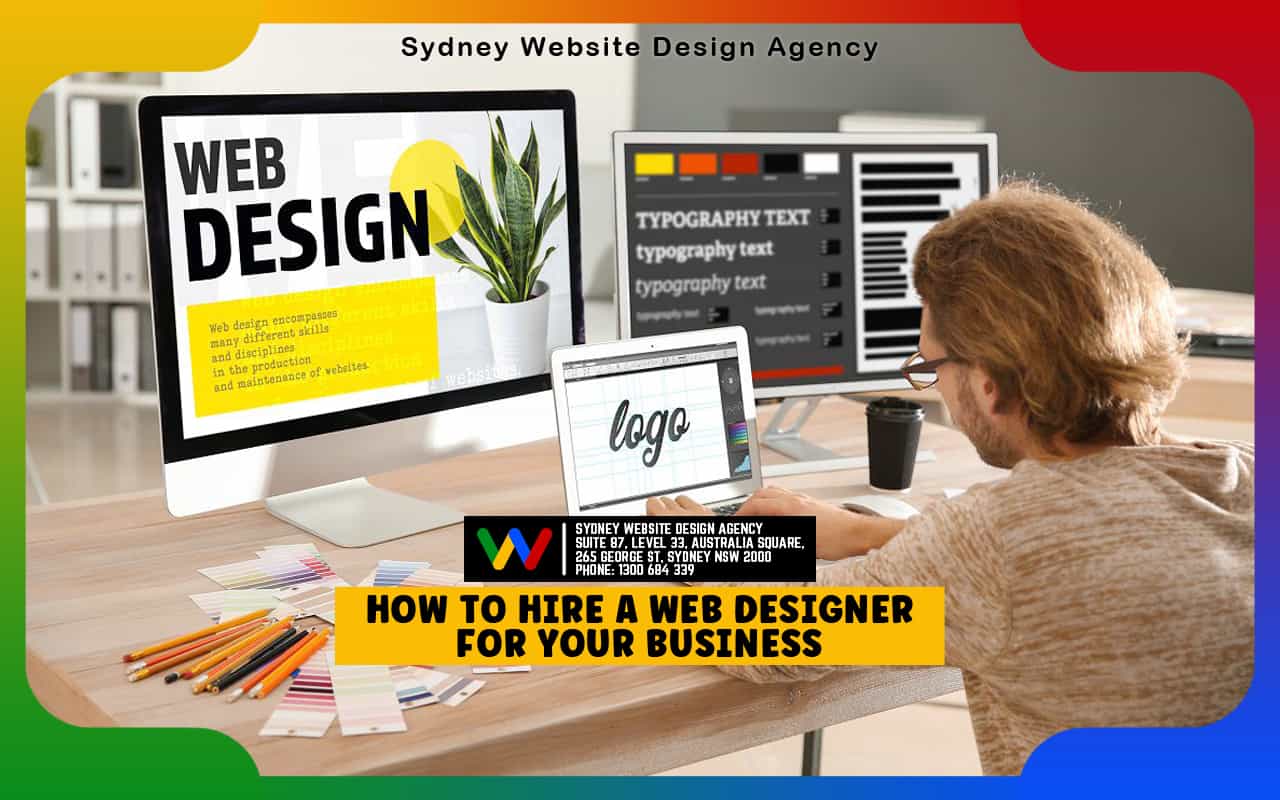
Hiring Sydney web graphic designers for your business can be a game changer for your online presence. When done correctly, a good web design can bring a professional look to your brand, attract more customers, and increase your sales. To hire the right web designer for your web development process needs, you need to do your research, define your goals, create a budget, and establish clear communication with your potential candidates.
You can also ask for referrals, check portfolios, and see if the web design service you hire has experience in your industry. Remember that the goal is to find someone who can turn your vision web project into a reality, so be patient and choose wisely.



















